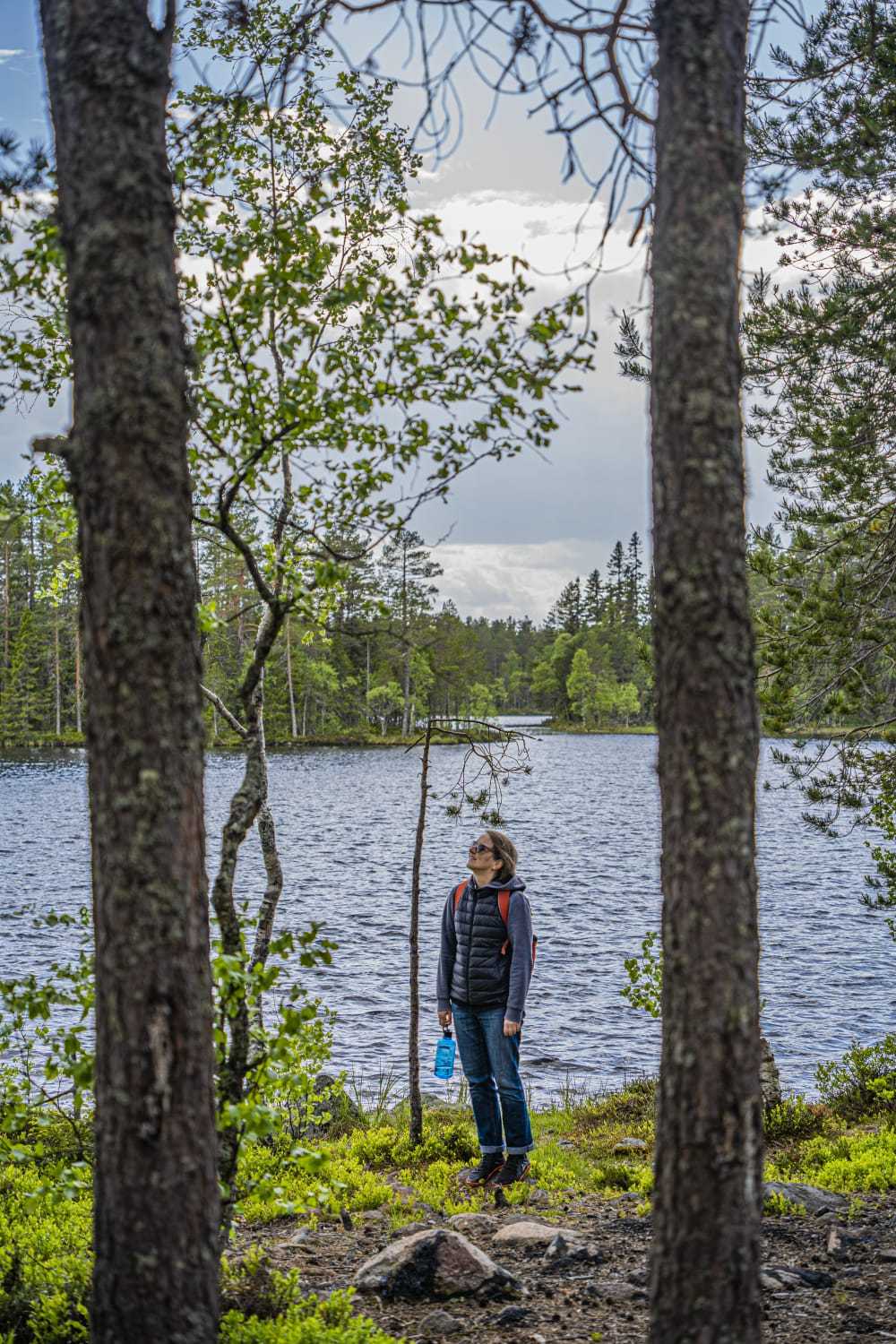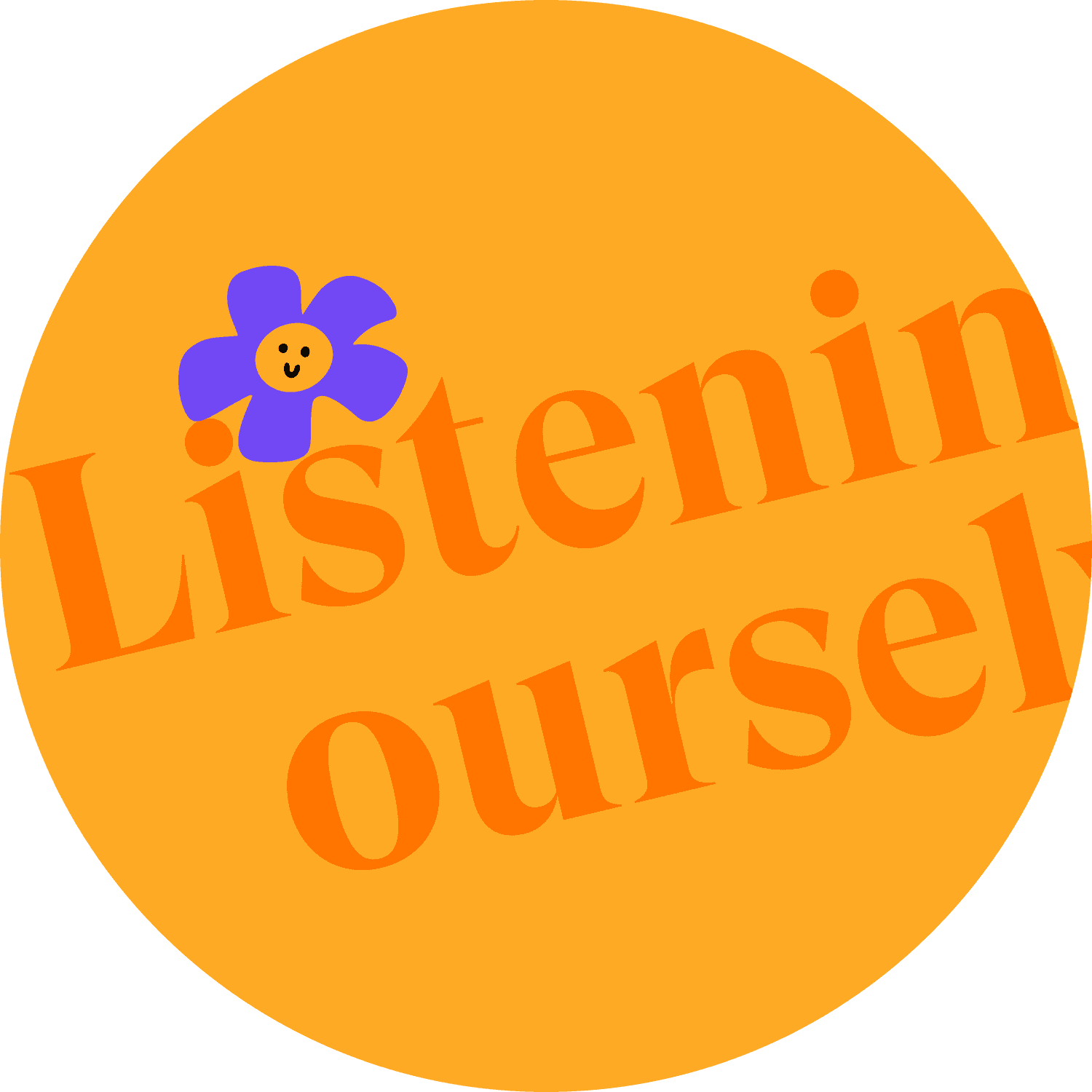
Have you noticed how products ranging from diesel to wet wipes have suddenly become “eco”, “eco-friendly”, “green”, “bio”, “organic”, “clean”, or “sustainable”, replacing previously typical labels like “best”, “cheapest”, and “number one” seemingly overnight?
Yet simultaneously temperatures are rising, non-recyclable waste clogs our oceans, and the sixth extinction is well underway. With such a clean market and such sustainable lifestyles, how come the living world is still in big trouble? What could be going wrong if we’re doing so many things right?
According to billboards and TV ads the world seems to be doing fine… but take off the pink goggles and you’ll see that the reality falls far short of the promises.
Though over-consumption and ecological collapse are alluded to by an obscenely lucrative advertising industry – to demonstrate companies’ supposed bleeding-heart politics – the real intentions are far from noble. Dishonest language (and that’s putting it politely), green claims and glittery campaigns are presented to the public with the sole intention of bolstering stockholders’ financial profits, as reassurance that everything remains healthy, ethical, and by the book along the supply chain.
The public relations game 📯
Trust and honesty are not the primary expectations of marketing, advertising, or public relations. The illusion that your life will be completed by, or that you will be made happier/sexier/more fulfilled/more attractive by a particular new product is the lifeblood of the advertising industry.
On some level, we all know this. Yet a credulous majority still buys into the fantasy of life being improved by an item destined for landfill in a matter of months.
Downplaying the consequences of producing the goods feeding this fantasy – ecocidal pollution and habitat destruction; bulldozing of human rights; abuses of power (by the ‘developed’ world over the ‘developing’) – is a new game, one with dangerous and lasting effects.
This is ‘greenwashing’: a relatively recent PR practice, usually associated with wasteful, polluting companies, that uses marketing campaigns to fabricate a veneer of sustainability and environmentally friendliness; wrong-doing deceitfully masquerading as virtuous solutions.
Defining greenwash 🦎
The term greenwash was coined by environmentalist Jay Westerveld in 1986 (inspired by an incident involving luxury towels on a beach in Fiji, rather than industrial-scale pollutants); by the end of the 1990s it was included in the Oxford English Dictionary: “disinformation disseminated by an organization so as to present an environmentally responsible public image.”
The Centre for Media and Democracy’s definition widens its reach beyond marketing campaigns:
“Greenwashing is the unjustified appropriation of environmental virtue by a company, an industry, a government, a politician or even a non-government organization to create a pro-environmental image, sell a product or a policy, or to try and rehabilitate their standing with the public and decision makers after being embroiled in controversy.”
Wikipedia defines this compound word (also called green sheen), modelled on whitewashing, as “a form of spin in which green PR or green marketing is deceptively used to promote the perception [that] an organization’s products, aims or policies are environmentally friendly.”
Below we will focus on the greenwashing around us, splashed by marketing campaigns across walls, screens, and print.
Different shades of greenwashing 🧪
No doubt you’ve spotted greenwashing already, but didn’t necessarily realise it had a name. An IRL example: my local convenience store produced a massive new sign, promoting itself as the place for green products and “organic groceries” (on a green background, naturally). Less than a third of its shelves actually carry organic products.
People in the area are keen to buy organic, local, independent products. The shop’s owners know this, and their green signage likely attracts these customers (who may even demand more of the promised organic produce, encouraging the expansion of this side of the business). Though a mild form of greenwashing, the practise is often much more pernicious than some green paint on the front of a shop.
Old-school greenwashing 🗞️
The practice of falsely proclaiming cleanliness, safety, and responsibility dates back to the 1960s and “continued at a steady, moderate level through the first Earth Day in 1970.”
Growing post-war economies were focused on financial profit at all costs, including through experimentation with new practices of the times, but with little interest in proper disposal of hazardous waste or the lives crippled in the process.
When a harmful incident took place, due to little regulation, it would be glossed over in bright green colours. Many greenwashing campaigns pop up in this way, following ‘an incident’ that damaged the public image of the company in question.
“As the contemporary environmental movement built momentum in the mid-to-late 1960s, undermining the public trust in many a corporation, newly greened corporate images flooded the airwaves, newspapers and magazines. This initial wave of greenwash was labeled by former Madison Avenue advertising executive Jerry Mander and others at the time as ‘ecopornography’.” ― Joshua Karliner
The US Environmental Protection Agency was “born in the wake of elevated concern about environmental pollution”, in 1970. It was intended “to consolidate in one agency a variety of federal research, monitoring, standard-setting and enforcement activities to ensure environmental protection.”
Most countries have agencies that monitor (or should monitor) big polluters and ensure the general public doesn’t end up with an unhealthy environment. Ideally these agencies should also monitor the PR tactics paid for or supported by the same polluting companies, tactics designed to distract from, cover up, or downright lie about issues relevant to the general public.
Further reading: A Brief History of Greenwash by Joshua Karliner
Keeping up with the times 🖱️
The outrageous corporate environmental claims of the late twentieth century have gradually became more sophisticated and nuanced, while reaching larger audiences with the onset of digital communication.
Greenwashing has now grown into a chameleonic, multi-tendrilled structure tended by spin doctors, consultants, marketeers, and myriad others. It is used to increase sales, push through legislation obscuring levels of pollution, and generally improve polluters’ reputations, strengthening their authority and position on global and local levels. The more products being sold, the more malpractice to hide and truths to bend.
Today, greenwash appears in:
- Commercials (TV, radio, digital media, print, windows, street banners – you name it)
- General PR campaigns (when called out for environmentally unfriendly practices, the company’s solution is often a promotional campaign to publicly clean up their act)
- Corporate social responsibility policies
- Legislation (Barry Commoner coined the term “linguistic detoxification”: when, “through legislation or other government action, the definitions of toxicity for certain substances are changed, or the name of the substance is changed, so that fewer things fall under a particular classification as toxic”)
- Offsetting.
And much more.
Now, imagine a corporation running a business that is hazardous by nature, with a global impact (paint, oil, gas, mining, etc.). Imagine it attempting to camouflage its spills, and its poisoning of air and water, by erecting a green sign outside its oil distilleries or open-cast mines. When air is no longer breathable and water no longer fit for drinking, the willful, criminal inadequacy of attempting to persuade the public otherwise becomes clear.
Transnational corporate greenwashing 📉
Greenwashing becomes truly damaging in the hands of big transnational corporations (TNCs), impacting entire industries, countries, and social groups. It’s this element of greenwashing that draws most attention from researchers, journalists, and academics.
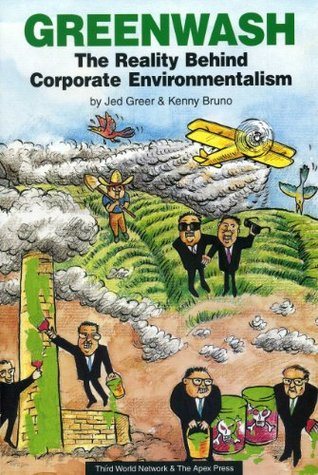
In their book Greenwash: The Reality Behind Corporate Environmentalism, Jed Greer and Kenny Bruno detail case studies of TNC greenwashing campaigns prior to its publication in 1996.
The typical scenario is simple: like the ‘organic’ shop with little to back up its claim, TNCs heavily promote promises which sound like a big deal, but are in actuality insignificant by comparison to the huge unseen damage they inflict.
There are notorious examples of greenwashing in most industries, though funnily enough those polluting most are the worst offenders: the clothing, oil, gas, coal, mining, and paper industries all have an impressive track record of greenwashing. For instance, every stage of oil production (exploration, production, transportation, manufacturing, and consumption) can cause enormous damage to both the environment and human health – making the industry’s exaggerated public-facing green credentials all the more egregiously unjustifiable.
Here’s a selection of corporate greenwash in posters from the 80s and 90s, examined in Greer and Bruno’s book. I have omitted company names – some of which continue to greenwash 40 years later – since these examples apply just as well to entire industries:
- Image of a toddler hugging the globe, with the caption “protected by”… an oil company that has been aware of climate change for decades (due to studies they ordered), yet does almost nothing to tackle it, instead supporting campaigns that stall action on the climate crisis. From the same corporation comes a priceless quote claiming that “as long as the earth needs someone to care for it [we can be sure of them]”.
- Pristine river in ad for a chemical corporation responsible for one of the worst toxic river spills in history.
- Ad claiming an herbicide works “in perfect harmony” with nature, for the producer of an extremely toxic herbicide banned in five countries at the time.
- Photo of a bird in midair with a fish in its beak and the word CARING underneath… for major chlorine and polyvinyl chlorine manufacturer bragging about “recycling” chlorinated waste – in reality a dangerous form of waste incineration.
- Plastic and waste disposal industries appropriating the language of recycling by applying it to processes which in no way accomplish the true purpose of recycling. They exploited the public’s enthusiasm for recycling and used it to cover dirty operations (a very common form of greenwashing); sometimes “recycling” becomes a euphemism for sending the waste abroad (largely from wealthy countries to poorer ones).
- Ad showing clouds and lab scientists, with the headline “protecting the skies” – for a transnational chemical company, “leader” in ozone destruction, and massive generator of hazardous waste and toxic lead gasoline additives.
For all the juicy details, and case studies based on years of investigations and expert backing, you’ll have to read the book.
How do we spot greenwashing? 🔍
It may sound like a job for Sherlock and co, but anyone curious about the world can identify greenwashing. If you flex your critical eye, I guarantee you’ll end up rolling your critical eyes all too often when walking in the city, watching TV, or browsing online.
Here are some pointers:
When it’s too good to be true
For example, compostable coffee pods, flushable eco-wipes, clean coal, or eco diesel…. A Fashion Revolution fanzine advises that we question everything: “If a product claims to be carbon neutral, 100% organic, 100% anything in fact, chances are it’s 100% greenwash.”
Look for the seven sins of greenwashing
These sins were coined in 2009, when the environmental marketing agency TerraChoice (sister company to UL) evaluated 5,296 products on the market, and established that only 4.5 percent were sin-free, with “products [that] passed muster on seven common greenwashing missteps.” The research revealed that a vast majority of products (more than 95 percent) claiming to be green were stretching the truth in some way.
Here are the seven sins:
1. The Sin of the Hidden Trade-Off (presenting a product as green by highlighting a single environmental attribute without acknowledging the full environmental impact)
2. The Sin of No Proof (making environmental claims with no evidence backing them up)
3. The Sin of Vagueness (the use of feel-good language so vague as to be meaningless)
4. The Sin of Irrelevance (a claim that’s truthful but unimportant or unhelpful)
5. The Sin of the Lesser of Two Evils (labeling products like cigarettes as organic to distract from their fundamental problems)
6. The Sin of Fibbing (claims that are simply untrue)
7. The Sin of Exaggerating 🎭
Read more about them here.
Words and visuals go hand in hand
There have been myriad attempts to classify consumer behaviour in response to different colours in advertising. The colour green is often associated with peacefulness, health, nature, environmental benefits, organic, and growth. Yet… British Petroleum uses it in their logo. And so does Greenpeace. Obviously, you can’t ban a company from using a colour, but you can try and spot the other shades lurking in the back.
Check out watchdog initiatives like the Hall of Shame 🖼️
In the year 2000, the Public Eye on Davos campaign was begun as a counter-summit to the World Economic Forum, subsequently growing into a powerful online campaign, naming and shaming companies with its awards from 2005 to 2015. The Hall of Shame features all the companies that have won a Public Eye Award: “corporations whose business activities have been characterized by human rights violations, environmental destruction, immoral tax practices or corruption.”
Further reading: The story behind this campaign here.
How do we resist greenwash? 🛡️
Be skeptical of ads
If you don’t suffer from banner blindness, examine everything. Do a quick search about the company you’re about to buy from for the first time. No doubt many companies look back with nostalgia at the halcyon days when consumers’ news came from television, radio, and print media which could be easily flooded with “high-priced, slickly-produced commercials and print ads”.
Once you become accustomed to questioning misleading claims so proudly made in the public space, it won’t feel like homework. Companies don’t expect you to question their marketing – all the more reason to remain vigilant.
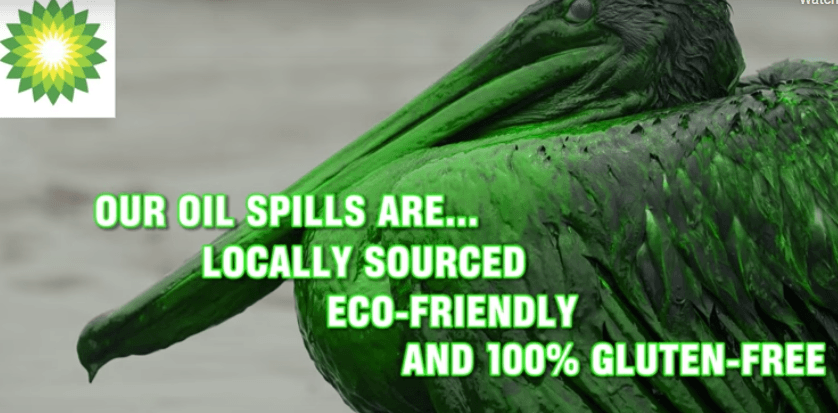
Some simple questions to ask:
- Why? (e.g. Why does a ‘sustainable’ cosmetics company still uses non-recyclable plastic packaging? Why would an oil and gas company pretend to be an energy company while pushing for new fossil fuel drilling? Why would an oil company claim to be focused on the future, when it has “ambitious plans to grow its [destructive] oil and gas production 16% by 2025”?
- What? (e.g. What does it mean for a financial institution such as a bank to be ‘natural’? Has it divested from fossil fuels? Does it invest only in sustainable projects?)
- Why now? (Context is everything. Was the company, product, or brand involved in a recent scandal, investigation, or similar?)
- How? (e.g. How are they achieving what they brag about? Are there any figures, documents, or real-world achievements out there?)
Ask yourself these questions, and if answers aren’t forthcoming, take them further by writing to the company, asking why/why now/how/what? Start by questioning the consumer products and services you commonly use.
Follow trustworthy media outlets (which don’t shy away from investigations)
Keep an eye on figures and facts. Facts should speak louder than paid-for promotional posters; use them to make your case, ask your questions, and start clarifying conversations.
Add your expertise to the Citizen’s Guide to Greenspeak
Greenwash. The Reality Behind Corporate Environmentalism includes a few helpful definitions of greenwashing vocabulary. Here are four:
- “Excellent environmental performance”: Having fewer accidents while manufacturing deadly products.
- “Continuous improvement”: Industry has a terrible environmental record, but that will always be due to past practices.
- “Corporate environmentalism”: Environmental laws and citizen watchdogs are no longer necessary.
- “Change in corporate culture”: Prettier advertisements.
How do we act on greenwashing? 📢
Talk about it; make a fuss; boycott
- If you suspect your favourite brand is greenwashing you, reach out to them, asking for further details. In this competitive world, it is in their interest to listen to their customers; explain your concern.
- Talk to other people about your greenwashing discovery/investigation/concern, especially those in advertising who are creating these campaigns.
- Talk about it online. You can call them on their lies by starting a small social media campaign, if that’s your thing. Don’t forget to tag the company!
- Talk to your children about lying, so they grow up to be attentive humans and knowing not to take advertising for granted.
- Contact regulatory bodies such as the Advertising Standards Authority (ASA) when you spot greenwashing. You will need to provide evidence; regulatory bodies like the ASA and the Committees of Advertising Practice are ever-evolving systems, for which your support and expertise are crucial to stop greenwashing gaining yet more ground.
For instance, file a complaint if you spot something like this advertisement that implies gas is a “low-carbon energy” source. - Boycott companies that greenwash, and make sure they know it.
- Join organisations or campaigns that actively fight greenwashing, like the Art Not Oil Coalition, which attempts to end oil industry sponsorship of the arts (another form of greenwashing we’ll explore soon). Or BP or not BP? – “a merry troupe of players who came together in 2012 aghast that our beloved Bard’s works and memory had been purloined by BP in a case of greenwash most foul.”
- Encourage and support politicians and policymakers who push for tougher regulation on greenwashing marketing campaigns.
- Talk about the importance of an ecocide law, which would make destruction of the environment a crime against peace. This would keep the big polluters pretty busy cleaning up their act in real life.
Those who make big claims should back them up with strong evidence or drop them altogether. Sure, we’re talking about powerful industries, but they still need clients to survive, and that includes you, your business, and your family. In most countries ethical alternatives are available. Or you might even discover that you can do without.
Why should we care?
Greenwashing perpetuates and normalises the fallacy of business-as-usual in the face of ecocide, while also indirectly draining credibility from honest brands that are genuinely sustainable and environmentally friendly. “There’s no such thing as organic” is already a classic example as people often consider it’s just a trick to justify raising a product’s price. Few realise that “organic” is a hard-earned badge in certain countries, with farmers doing hard honest work to get it.
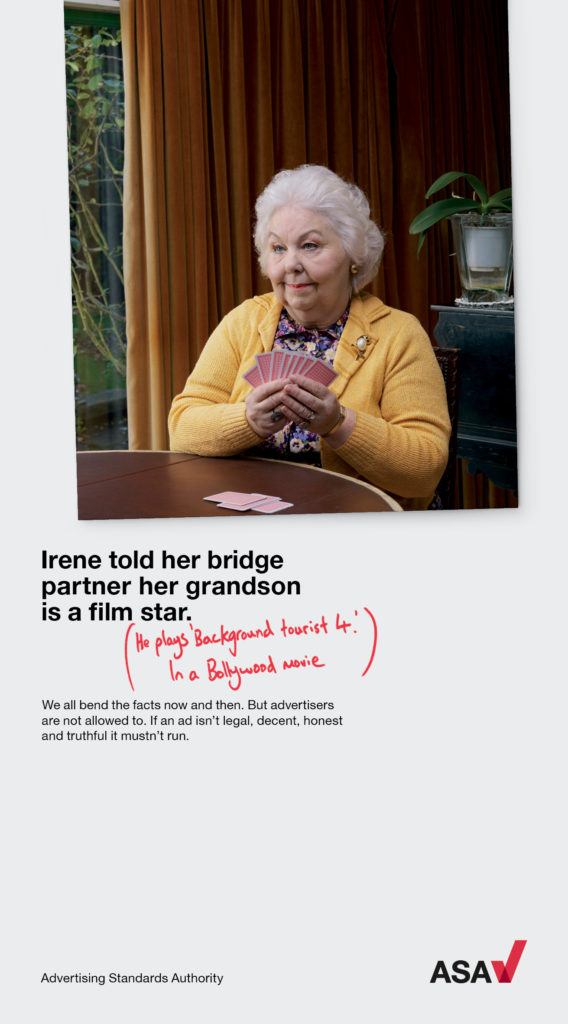
The illusion that a product is credible and a company greener encourages more and more people to purchase it. In being misguided into consuming an unethical product, we endorse the company that produced it, vindicating their dodgy practices. There is just too much at stake; we need to pay attention, especially when it comes to products and services we routinely consume.
By calling them on their greenwash, companies might start investing in cleaning up their act in reality, minimising their toxic environmental impact, instead of pumping large amounts of money into making themselves look green and respectable.
Uncovering greenwash won’t deter everyone from buying certain products, but may still make them think twice about investing or supporting it in other ways.
“… it is tragic to contemplate the pernicious effect such ads can have on children, who may grow up believing that oil companies are the main preservers of wilderness or that farmers need synthetic chemicals to work in harmony with nature. But the real political danger of greenwash lies in the possibility it will convince governments and intergovernmental organizations to abdicate further their responsibility to regulate and hold accountable the TNCs.” ― Greer and Bruno
“You should be able to trust the ads you see” was a national ad campaign run by the ASA, encouraging people to report falsities in the words and images that surround us. “Over the years, the advertising self-regulatory system has responded to changes in society and media. The system is continuing to develop based on the enduring principles that ads should not mislead, harm or offend.”; resistance to greenwashing could have a positive impact. Don’t sit this one out.
Let’s talk greenwash!
We’ve barely scratched the surface here, so we want to keep this conversation open. With an ever-changing mediascape, greenwashing will have to keep up with the changes. Spotting greenwashing in our everyday lives may start as a game or challenge, but it can become something more significant, motivating us into action. Comment below or join us on our community forum! Thanks.
Earth.fm is a completely free streaming service of 1000+ nature sounds from around the world, offering natural soundscapes and guided meditations for people who wish to listen to nature, relax, and become more connected. Launched in 2022, Earth.fm is a non-profit and a 1% for the Planet Environmental Partner.
Check out our recordings of nature ambience from sound recordists and artists spanning the globe, our thematic playlists of immersive soundscapes and our Wind Is the Original Radio podcast.
You can join the Earth.fm family by signing up for our newsletter of weekly inspiration for your precious ears, or become a member to enjoy the extra Earth.fm features and goodies and support us on our mission.
Subscription fees contribute to growing our library of authentic nature sounds, research into topics like noise pollution and the connection between nature and mental wellbeing, as well as funding grants that support emerging nature sound recordists from underprivileged communities.

